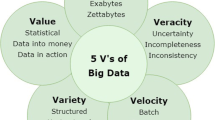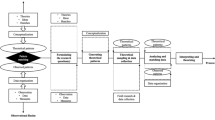Abstract
Local sources of knowledge structured in the form of logic descriptors—constructs of fuzzy logic, are arranged together (structured) in the form of a global model coming as a high-level granular logic descriptor. The inherent granularity of the global descriptor of this nature arises as a manifestation of the diversity of the locally available descriptors. The granular descriptor can be expressed with the aid of any of the formal models of information granules including sets, fuzzy sets, rough sets, probabilistic granules and others. The architectural essence of the granular descriptor, which supports a quantification of the variability among the sources of knowledge, is realized through an optimal allocation of information granularity. Information granularity is treated as an important design asset and its allocation throughout the parameters of the logic descriptors helps quantify the diversity of individual sources of knowledge. Various protocols of allocation of information granularity along with an overall quantification of their effectiveness are discussed along with their numeric characterization.








Similar content being viewed by others
References
Bargiela A, Pedrycz W (2003) Granular computing: an introduction. Kluwer Academic Publishers, Dordrecht
Bargiela A, Pedrycz W (2005) Granular mappings. IEEE Trans Syst Man Cybernet Part A 35:292–297
Bargiela A, Pedrycz W (2008) Toward a theory of granular computing for human-centered information processing. IEEE Trans Fuzzy Syst 16:320–330
Bezdek JC (1981) Pattern recognition with fuzzy objective function algorithms. Plenum Press, New York
Gobi AF, Pedrycz W (2007) Fuzzy modeling through logic optimization. Int J Approx Reason 45:488–510
Hirota K (1981) Concepts of probabilistic sets. Fuzzy Sets Syst 5:31–46
Pawlak Z (1991) Rough sets: theoretical aspects of reasoning about data, system theory. Kluwer Academic Publishers, Dordrecht
Pawlak Z, Skowron A (2007) Rudiments of rough sets. Inf Sci 177:3–27
Pedrycz W (1998) Shadowed sets: representing and processing fuzzy sets. IEEE Trans Syst Man Cybernet Part B 28:103–109
Pedrycz W (2005) Knowledge-based clustering: from data to information granules. Wiley, Hoboken
Pedrycz W, Gomide F (2007) Fuzzy systems engineering: toward human-centric computing. Wiley, Hoboken
Pedrycz W, Bargiela A (2010) Fuzzy clustering with semantically distinct families of variables: Descriptive and predictive aspects. Pattern Recogn Lett 31:1952–1958
Pedrycz W, Bargiela A (2012) An optimization of allocation of information granularity in the interpretation of data structures: toward granular fuzzy clustering. IEEE Trans Syst Man Cybernet Part B (To appear)
Pedrycz W, Hirota K (2008) A consensus-driven clustering. Pattern Recogn Lett 29:1333–1343
Pedrycz W, Rai P (2008) Collaborative clustering with the use of Fuzzy C-Means and its quantification. Fuzzy Sets Syst 159:2399–2427
Zadeh LA (1997) Towards a theory of fuzzy information granulation and its centrality in human reasoning and fuzzy logic. Fuzzy Sets Syst 90:111–117
Zadeh LA (1999) From computing with numbers to computing with words-from manipulation of measurements to manipulation of perceptions. IEEE Trans Circ Syst 45:105–119
Author information
Authors and Affiliations
Corresponding author
Rights and permissions
About this article
Cite this article
Pedrycz, W. From logic descriptors to granular logic descriptors: a study in allocation of information granularity. J Ambient Intell Human Comput 4, 411–419 (2013). https://doi.org/10.1007/s12652-012-0127-x
Received:
Accepted:
Published:
Issue Date:
DOI: https://doi.org/10.1007/s12652-012-0127-x




